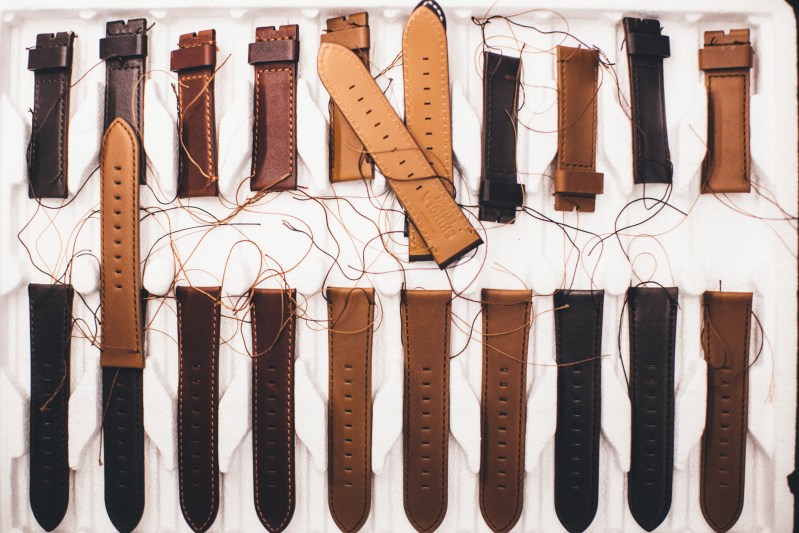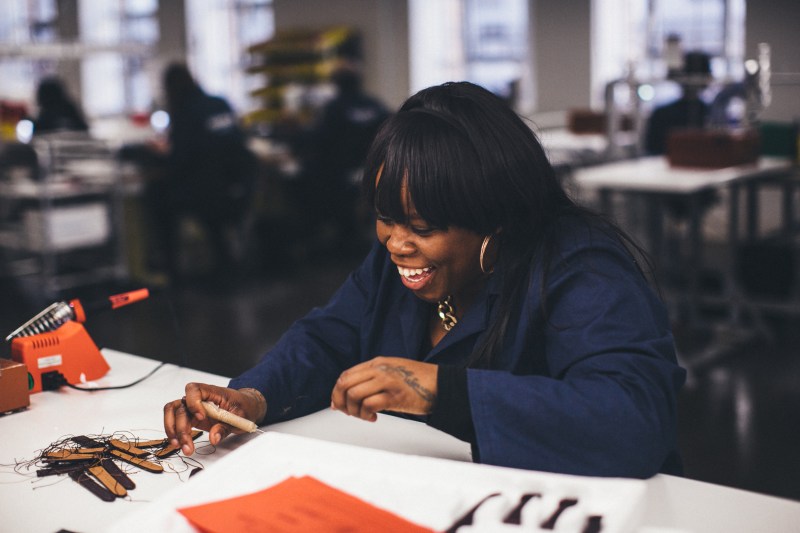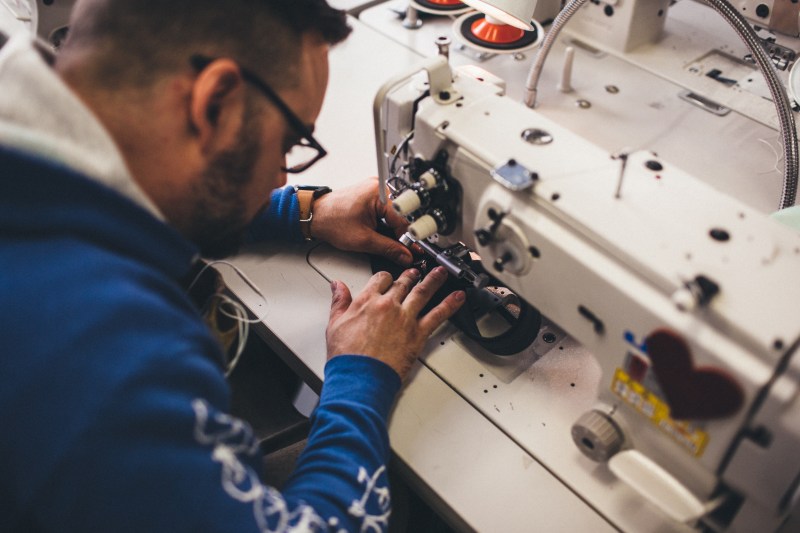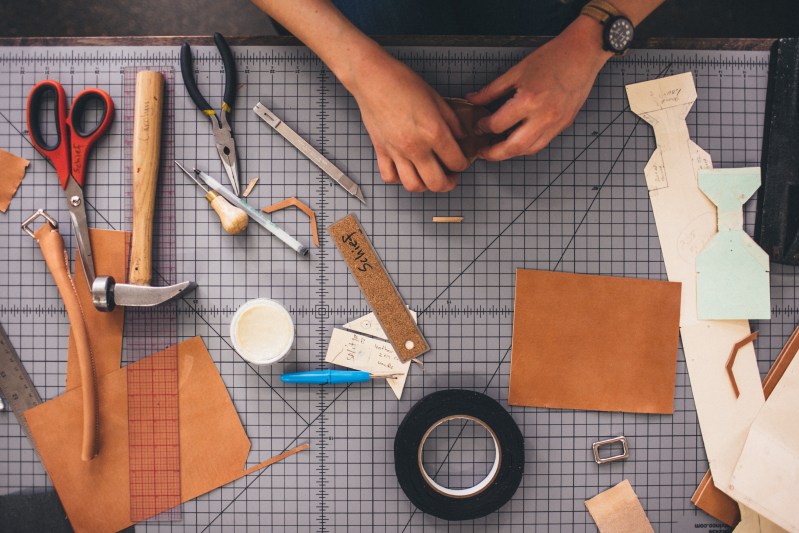From paleo-rawhide used for tents and proto-clothing, to today’s cordovan or alligator leathers, humans have a habit of protecting ourselves with the skins of other animals. And we’ve been doing it for thousands of years.
So, it’s no big surprise that leather working and leather goods contribute upwards of 40 billion dollars annually toward the global economy. And because most of today’s leathers come out of third-world countries that lack environmental protections and worker safety laws (we’re looking at you, India), American leather goods company, Shinola, has eschewed outsourcing and returned leather working and manufacturing to one of America’s most economically downtrodden cities, Detroit, Michigan.
Now, it’s no secret here at The Manual that we are big fans of Shinola Detroit. We’ve previously covered everything from Shinola watches to the in-the-works Shinola Hotel, to their array of great-looking and great-riding bicycles. It was this love of Shinola goods that secured an invitation to join Shinola for a Maker’s Retreat this summer, hosted by Camp Wandawega. During the course of the retreat, we learned the basics of craft cocktail construction, were introduced to a fantastic humanitarian and environmental-rescue product in Detroit Dirt, and, best of all, we were given a master class in leather working by Shinola’s Vice President of leather, Jennifer Guarino, who provided us with the behind the scenes story of why Shinola in 2014 chose to build its leather goods factory in the heart of Detroit and what it means for a luxury leather product to be designed, cut and sewn in the U.S. with American leather.

Guarino began with a short, but succinct history of Shinola’s leather production. In 2013, when Shinola first looked into taking on the responsibility of designing, patterning, and manufacturing the majority of their leather goods in their own factories (not just their watch straps), it was a major revolution in leather working in America when taken in the context of the then-state of leather manufacturing in the country.
“Just to give you an idea of how decimated the leather industry had become in the United States–there was a survey done by the Department of Labor in 2013, that revealed that, at that time, there were 112 [leather] manufacturers left in the United States,” said Guarino. “Of those, 90 percent had less than eight people working in them. That’s an industry that has been decimated.” And that decimation came directly from offshoring and outsourcing production, and the expansion of global trade.

Shinola wanted to change all that. The brand’s foundation rests on its genuine desire for goods and accessories to be not just American made, but obviously American made. When, during a focus group, they discovered they were able to charge more for a product that was not only made in America, but made specifically in Detroit, they began to understand that people, not profits were the driving factor behind Americans’ willingness to spend a few extra dollars. As long as those additional bucks are going back into a blighted economy, the act of buying a Shinola product become a tangible contributor to the revitalization of Detroit. Consumers were happy to shell out far more money in a bid to “do their part” to prop up fellow Americans, rather than just buying for the made in America cache. Shinola took that to heart.

For Shinola, it’s not just about the product, it’s also about their employees and the community that surrounds them. Guarino stated, “We started teaching people from scratch. We brought a lot of people from the auto industry, people who knew something about production, but had never really worked with leather. And we kind of learned the hard way that that’s not a perfect transition because with leather, it’s very unlike other production. It’s an art and it’s a science in that it’s imperfect. Every piece of leather is imperfect.” But they didn’t give up.
“If you’re bringing in someone to work on an assembly line,” said Guarino, “we’re asking them to do more than just plug, click, and pass on. We’re asking them to use their judgement, use their aesthetic, and actually empower them to make decisions about every single piece of leather that they’re passing. So we had to teach people that we want you to look at every piece of leather as a unique piece and we want you to piece it as it goes through, and if you need to manipulate it, we’ll teach you how to manipulate leather so that the piece does what you need it to do.” By imbuing their workers with the power to make decisions about the goods they create and providing them top-of-class training by world experts, Shinola has given their employees the opportunity to not just do a job, but to take pride in it and value themselves as makers rather than labor drones. Their values and judgement affect what goes to market and that’s something rarely done in the manufacturing world.

In keeping with Shinola’s goal of helping employees better their own lives and their communities, the brand built a custom factory in Detroit, full of natural light, where every worker, also known as artisans, have a view. As guarino notes, “When you go into the factory you feel it right away. The energy is phenomenal.”
And she can’t help but gush about the future of these employees: “We expect that as we grow, this team in Detroit will be the most highly qualified, most highly skilled leather craftsmen in the whole United States. Then, with College for Creative Studies, in September of this last year [2015], we worked with them creating a four year design program in accessories design—specifically leather goods, hardware, and shoes. So, now in one building, we are teaching people to design for manufacturing, we’re interning them, and we’re hiring them. There’s nothing like it. We’re creating an industry hub in Detroit.”

And it’s a hub that isn’t going anywhere. Guarino notes in this TED talk from 2014, that they have employees that came to them from unemployment, underemployment, and lower-wage manufacturing jobs that are now empowered artisans and craftsman with a valuable skill and drive to succeed and grow. Guarino speaks proudly of one of Shinola’s watchmakers who, even though she had never before been on a plane, went to Switzerland to study with the best watchmakers in the world so that she herself could become a master watchmaker. And she brought that skill right back to America–right back to Detroit. American made has more meaning when the Americans doing the making are treated well and benefiting from the products they make. Shinola has perfected this process and their success in this aspect of business is one of the driving forces behind their growing popularity and respect for Shinola as an authentic American luxury brand.
A quick note on the term American Made: The Federal Trade Commission defines “American Made” as a product where “all or virtually all of the product has been made in America. That is, all significant parts, processing, and labor that go into the product must be of U.S. origin. Products should not contain any – or should contain only negligible – foreign content.” Shinola products are technically constructed in America using some foreign parts, preventing them from using the official term American Made or Made in the USA. However, Shinola has recenly begun production on its first ever “Detroit–Made” style–The Accordion Cross Body Bag. The labor for this bag is now done entirely in Detroit and Shinola uses above 90 percent US components, making this bag officially and truly “Detroit-Made.”


